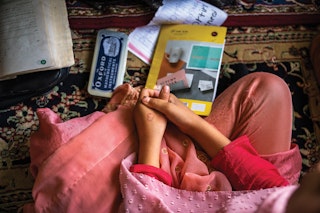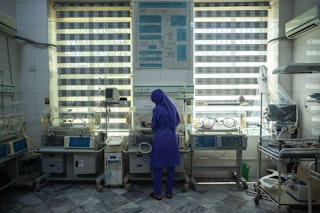I SEE NO BEAUTIFUL COUNTRY WITHOUT WOMEN.
Shogufa
"After the arrival of the Taliban, almost all the activities of female students were disturbed. All the committees in which we were active have now been dissolved. Before the Taliban, all young women and men used to work in groups together. Gender segregation in universities has reduced these activities to zero. In most colleges, the internship programme for students in the 7th or 8th semester has been cancelled for young women. This is because girls are not allowed to travel by themselves without a mahram [male chaperone] outside the university – for field or group work.
I feel cut off from society. For us, those projects were the reasons for believing in a better future for women, for a better future for Afghanistan. All those hopes have been destroyed.
Now, we pretend to be hopeful about being alive. In fact, no one is sure or hopeful that the situation of women’s lives will get better or change, even if the Taliban would be gone. What I have experienced so far is all disappointing; despite women studying and working in this type of university.
Even before the Taliban, the university management and leadership was dominated by men. Women lecturers and professors were less appreciated, and they had less opportunity for promotion or to be part of the leadership structure. Women were not even allowed to teach at higher level. Now it is worse. The new situation in the country has caused many academic staff to flee abroad. Now, male professors should teach only male students and female professors should teach only female students. All these changes are downgrading university work.
The Taliban’s dress code for women to enter the university is a serious cause of stress. Every time we present ourselves at the entrance of the university, we are anxious over whether we will be admitted. We are living with the fear that they may ban us from attending classes tomorrow.
In the last year, all of us went through some kind of mental breakdown. I myself am devastated and hopeless. Before the Taliban, women had some rights, at least on paper, in the law books. They somehow had the right to dress freely.
Since the Taliban came back to power, the focus of their politics is on repressing women and imposing a dress code for them. The centre of the Taliban’s politics is removing women from social life and controlling their bodies. On the first day, the Taliban decreed that all female students should be dressed in Islamic clothing. What is Islamic clothing? They meant women should be in a long black gown, black veil, black mask and long black shawl.
During the first Taliban era in the 1990s, many women adjusted themselves to the Taliban’s unfair dress code, but our generation will not do the same. Many women still dress as they like, not as the Taliban decreed. However, they are still scared of the Taliban and cover their face so as to not be recognized. We women are scared of the Taliban, when we are going to demonstrate or passing a soldier. We are not sure if we can walk by them without being lashed. I have not changed my style of dress, but still I am scared each time.
It was so hard to hear that the Taliban decreed that no female student is allowed to move without a mahram and no taxi driver is allowed to pick up an unaccompanied woman. It is stressful to have to give so much thought each day to how to dress so as to not be arrested and lashed by the Taliban.
I remember the scary day that I had to write an exam at the university. I took a taxi. On my way to the university, I was scared almost to death at the Taliban checkpoints, as if they stopped me I would not be able to take my exam. I could not concentrate on the exam either.
On that and every other day, I am afraid and have anxiety when passing Taliban soldiers on the street. I think it is actually not fear or anxiety but anger. I am so angry about not being able to change the situation. This anger stops me from doing everyday tasks. I am planning to study hard each day and make a better future, but on my way back home when I see the situation of the city, the miseries of women, the hopelessness spread throughout society, I feel paralysed.
The worst memory of my life happened just a few days ago when the female students of Herat University organized a demonstration to raise awareness about the Hazara Genocide. I hadn’t heard gunfire that close until then. The anger and distress in me wouldn’t let me settle down. I kept thinking how could one speak of murdering or decapitating someone so easily? One of our fellow demonstrators was pregnant. She couldn’t stand it and fainted. We took her to hospital.
I don’t think the future that I have pictured for myself can come true in Afghanistan. No matter what change or ruling system comes to this country, I cannot stay here; some memories and experiences cannot be forgotten.
The other important matter is that people have not changed much during the past two decades. Except for women’s movements, the greater part of the population has not changed. The situation gets worse day by day. I cannot cope with this social order. Most women have no chance of leaving the country at all. All are waiting impatiently for the country to change.
The events of the past year have showed everyone that the women of Afghanistan are not the women of 20 or 25 years ago. Currently, the last hope for Afghanistan are the country’s existing women’s movements. We didn’t see much from the men of Afghanistan in this past year. I believe women can change a lot of things; see, for example, the recent protests in Iran. Women’s access to modern tools and social media has helped them become aware of their fundamental rights. This is exactly what brings integrity and connection among women’s movements of the region. If it continues this way, the Taliban will have to relax some of their restrictive rules.
Of course, international organizations must keep pressuring the Taliban. Throughout history, powerholders in Afghanistan have changed one after another in a relatively short period of time. I believe women can win their rights to movement, work and freedom of dress. One cannot expect any more. The only window of hope is a democracy that ensures more freedom for women."
